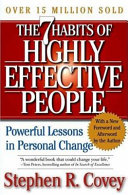

The first habit emphasizes the importance of taking responsibility for your life. Proactive individuals recognize that they are the creators of their own circumstances, as opposed to being victims of external events. This habit encourages individuals to focus on what they can control, rather than what they cannot. Proactive people understand that their responses to situations are within their control and that their choices shape their outcomes. By adopting a proactive mindset, individuals can shift their focus from blame and excuses to taking initiative and ownership of their actions. This habit lays the foundation for personal empowerment and encourages individuals to take charge of their lives, leading to greater effectiveness in both personal and professional realms.
Continue readingThe second habit focuses on the importance of having a clear vision of your desired outcomes. Covey encourages individuals to define their personal and professional goals, creating a mental picture of what they want to achieve. By beginning with the end in mind, individuals can make more informed decisions that align with their values and long-term objectives. This habit emphasizes the significance of setting clear priorities and understanding the purpose behind one's actions. Covey suggests creating a personal mission statement as a tool to guide decision-making and ensure that daily activities contribute to overarching life goals. This habit promotes a proactive approach to life, allowing individuals to navigate challenges with clarity and purpose.
Continue readingThe third habit builds on the first two by emphasizing the importance of prioritization and time management. Covey introduces the Time Management Matrix, which categorizes tasks based on urgency and importance. This habit encourages individuals to focus on what truly matters, rather than getting caught up in the urgency of less important tasks. By prioritizing effectively, individuals can allocate their time and energy to activities that align with their values and long-term goals. This habit promotes a disciplined approach to managing one's time, enabling individuals to achieve greater effectiveness and balance in their lives. It also encourages the cultivation of self-discipline and the ability to say 'no' to distractions that do not contribute to personal or professional growth.
Continue readingThe fourth habit introduces the concept of seeking mutually beneficial solutions in interactions with others. Covey emphasizes the importance of collaboration and cooperation in achieving effective relationships. The win-win mindset fosters a sense of abundance, encouraging individuals to view interactions as opportunities for mutual gain rather than competition. This habit promotes empathy and understanding, as individuals strive to recognize and appreciate the perspectives of others. By adopting a win-win approach, individuals can build trust and strengthen relationships, leading to more productive and harmonious interactions. This habit is particularly valuable in leadership and teamwork, where fostering a collaborative environment can lead to innovative solutions and shared success.
Continue readingThe fifth habit emphasizes the importance of empathetic listening in communication. Covey asserts that effective communication is rooted in understanding the perspectives and feelings of others before expressing one's own views. By practicing active listening and showing genuine interest in others, individuals can build stronger connections and foster a sense of trust. This habit encourages individuals to suspend judgment and seek to comprehend the underlying motivations and concerns of others. By prioritizing understanding, individuals can navigate conflicts more effectively and create an environment where all parties feel heard and valued. This habit is essential for effective leadership, as it promotes open dialogue and collaboration within teams.
Continue readingThe sixth habit highlights the power of collaboration and teamwork. Covey explains that synergy occurs when individuals come together to create outcomes that are greater than the sum of their parts. This habit encourages individuals to embrace diversity and leverage the strengths of others to achieve common goals. By fostering an environment of open communication and mutual respect, teams can generate innovative solutions and enhance creativity. Covey emphasizes that effective synergy requires a willingness to be vulnerable and to value the contributions of all team members. This habit underscores the importance of collaboration in achieving collective success, making it a vital principle for effective leadership and teamwork.
Continue readingThe seventh habit focuses on the importance of self-renewal and continuous improvement. Covey emphasizes that individuals must take time to invest in themselves physically, mentally, emotionally, and spiritually. This habit encourages individuals to engage in activities that promote personal growth and well-being, such as exercise, learning, and reflection. By prioritizing self-care and renewal, individuals can maintain their effectiveness and resilience over time. Covey argues that neglecting self-care can lead to burnout and decreased productivity. This habit serves as a reminder that personal effectiveness is not just about achieving goals but also about nurturing oneself to sustain long-term success and fulfillment.
Continue readingThe reading time for The 7 Habits of Highly Effective People depends on the reader's pace. However, this concise book summary covers the 7 key ideas from The 7 Habits of Highly Effective People, allowing you to quickly understand the main concepts, insights, and practical applications in around 21 min.
The 7 Habits of Highly Effective People is definitely worth reading. The book covers essential topics including Be Proactive, Begin with the End in Mind, Put First Things First, providing practical insights and actionable advice. Whether you read the full book or our concise summary, The 7 Habits of Highly Effective People delivers valuable knowledge that can help you improve your understanding and apply these concepts in your personal or professional life.
The 7 Habits of Highly Effective People was written by Stephen R. Covey.
If you enjoyed The 7 Habits of Highly Effective People by Stephen R. Covey and want to explore similar topics or deepen your understanding, we highly recommend these related book summaries:
These books cover related themes, complementary concepts, and will help you build upon the knowledge gained from The 7 Habits of Highly Effective People. Each of these summaries provides concise insights that can further enhance your understanding and practical application of the ideas presented in The 7 Habits of Highly Effective People.